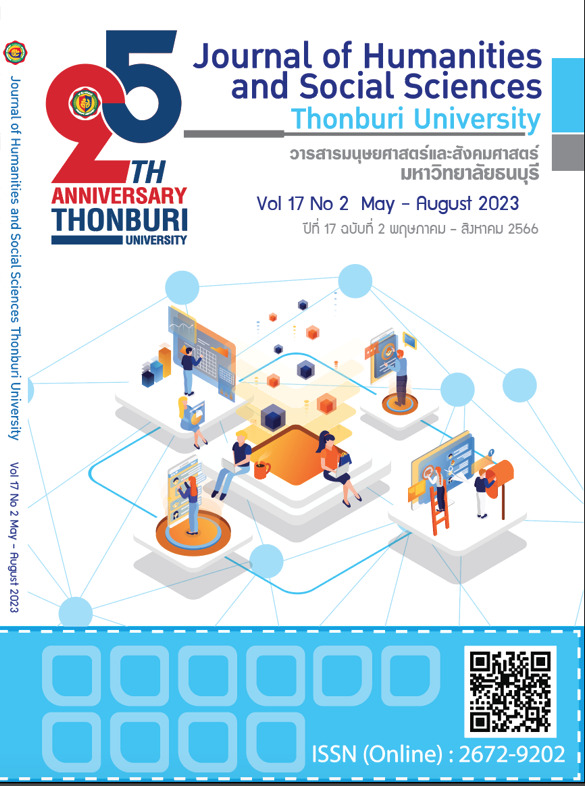การพัฒนารูปแบบการจัดการท่องเที่ยว 3 ธรรม เพื่อส่งเสริมสุขภาพผู้สูงอายุตามวิถีชีวิตไทยที่พอเพียง ในกลุ่มจังหวัดสนุก
คำสำคัญ:
การท่องเที่ยว 3 ธรรม, การท่องเที่ยวเชิงส่งเสริมสุขภาพ, วิถีชีวิตไทยที่พอเพียง, นักท่องเที่ยวผู้สูงอายุ, กลุ่มจังหวัดสนุกบทคัดย่อ
การวิจัยครั้งนี้มีวัตถุประสงค์เพื่อพัฒนารูปแบบการจัดการท่องเที่ยว 3 ธรรม เพื่อส่งเสริมสุขภาพผู้สูงอายุตามวิถีชีวิตไทยที่พอเพียง ในกลุ่มจังหวัดสนุก โดยทำการศึกษาปัจจัยที่มีอิทธิพลต่อการท่องเที่ยวเชิงส่งเสริมสุขภาพตามวิถีชีวิตไทยที่พอเพียง ในแหล่งท่องเที่ยว 3 ธรรม (ธรรมะ ธรรมชาติ วัฒนธรรม) ของกลุ่มจังหวัดสนุก (สกลนคร นครพนม มุกดาหาร) ด้วยวิธีการวิจัยแบบผสมผสาน โดยนำแบบสอบถามไปใช้กับกลุ่มตัวอย่างแบบเจาะจง ได้แก่ นักท่องเที่ยวผู้สูงอายุ ที่มาท่องเที่ยวในแหล่งท่องเที่ยว 3 ธรรม ครบทั้ง 3 จังหวัด จำนวน 100 คน และนำข้อมูลมาประมวลผลโดยใช้โปรแกรมการวิเคราะห์ทางสถิติ ร่วมกับการสนทนากลุ่มกับผู้แทนสถานพยาบาลที่มีบริการทางการแพทย์ที่เชื่อมโยงกับการท่องเที่ยวเชิงสุขภาพ ผู้แทนหน่วยงานภาครัฐและผู้ประกอบการด้านการท่องเที่ยว จำนวน 32 คน เพื่อหาแนวทางในการพัฒนารูปแบบการจัดการท่องเที่ยว ผลการวิจัย พบว่า กลุ่มจังหวัดสนุกมีภูมิศาสตร์และวัฒนธรรมใกล้เคียงกัน สถานที่ท่องเที่ยวล้วนแล้วแต่มีศักยภาพเพียงพอที่จะนำมาเชื่อมโยงเป็นเส้นทางท่องเที่ยวเชิงส่งเสริมสุขภาพได้ เมื่อวิเคราะห์ปัจจัยที่มีอิทธิพลต่อการท่องเที่ยวเชิงส่งเสริมสุขภาพตามวิถีชีวิตไทยที่พอเพียงของนักท่องเที่ยวผู้สูงอายุ ในแหล่งท่องเที่ยว 3 ธรรม กลุ่มจังหวัดสนุก พบว่า ปัจจัยที่มีอิทธิพลมากที่สุด คือ มาตรการป้องกันโรคโควิด-19 รองลงมา ได้แก่ ความปลอดภัยในการเดินทาง, ความหลากหลายของช่องทางการเดินทาง, ความสวยงามของสถานที่, ความมีชื่อเสียง, ความสะดวกสบาย ความปลอดภัยของห้องพัก, ความสะอาดและเป็นระเบียบ ตามลำดับ จึงสามารถจัดการให้เกิดรูปแบบการจัดการท่องเที่ยว 3 ธรรม เพื่อส่งเสริมสุขภาพตามวิถีชีวิตไทยที่พอเพียงได้อย่างเหมาะสมแก่นักท่องเที่ยวผู้สูงอายุ
เอกสารอ้างอิง
กรมการท่องเที่ยว. (2561). แผนยุทธศาสตร์พัฒนาการท่องเที่ยว พ.ศ. 2561-2564 ของกรมการท่องเที่ยว. กรุงเทพฯ: วีไอพี ก็อปปี้ปริ้น.
การท่องเที่ยวแห่งประเทศไทย. กองวิจัยการตลาด. (2562). รายงานฉบับสมบูรณ์ โครงการศึกษาพฤติกรรมนักท่องเที่ยวชาวไทยที่มีศักยภาพในการใช้จ่าย ปี 2561. กรุงเทพฯ: การท่องเที่ยวแห่งประเทศไทย.
คณะกรรมการนโยบายการท่องเที่ยวแห่งชาติ. (2564). แผนพัฒนาการท่องเที่ยวแห่งชาติ (พ.ศ. 2564 - 2565). กรุงเทพฯ: สำนักงานปลัดกระทรวงการท่องเที่ยวและกีฬา.
คมสิทธิ์ เกียนวัฒนา ; และคณะ. (2561). สถานการณ์และแนวโน้มการท่องเที่ยวเชิงสุขภาพโลกและประเทศไทย. วารสารกระแสวัฒนธรรม. 19(35): 77-88.
ชยพจน์ ลีอนันต์. (2565). แนวทางการจัดการการท่องเที่ยวเชิงสุขภาพเพื่อนักท่องเที่ยวผู้สูงอายุ. วารสารมหาวิทยาลัยราชภัฏยะลา. 17(1): 147-155.
บุญชม ศรีสะอาด. (2560). การวิจัยเบื้องต้น. พิมพ์ครั้งที่ 10. กรุงเทพฯ: สุวีริยาสาส์น.
ใบเฟิร์น วงษ์บัวงาม ;และ มุขสุดา พูลสวัสดิ์. (2556). การประเมินศักยภาพแหล่งท่องเที่ยวเชิงเกษตร โครงการที่ได้รับ รางวัลจากการประกวดผลงานตามปรัชญาของเศรษฐกิจ พอเพียงภาคการเกษตร ในเขตกรุงเทพและปริมณฑล. กรุงเทพฯ: มหาวิทยาลัยเทคโนโลยีราชมงคลพระนคร.
มธุรา สวนศรี, สมคิด สวนศรี ; และ พัชรินทร์ จึงประวัติ. (2565). การส่งเสริมการท่องเที่ยวเชิงสุขภาพผู้สูงอายุจังหวัด นครนายก. วารสารวิจัยราชภัฏเชียงใหม่. 23(2): 155-173.
ศิริพงษ์ ศรีไสไพร ; และคณะ. (2560). ความต้องการของตลาดและศักยภาพในการรองรับการ ท่องเที่ยวเชิงสุขภาพของประเทศไทย. ในรายงานสืบเนื่องการประชุมวิชาการ ระดับชาติครั้งที่ 12 เรื่อง Health and Wellness: สุขภาพและความสุขสบาย วันที่ 3 มีนาคม 2560. 591-605. มหาวิทยาลัยธุรกิจบัณฑิตย์.
Translated Thai References
Department of Tourism. (2018). Strategic Plan for Tourism Development 2018-2021 of the Department of Tourism. Bangkok: VIP copy print. (in Thai)
Kieanwatana, K., & et al. (2018). Situations and Trends of World and Thailand Health Tourism. Journal of Cultural Approach. 19(35): 77-88. (in Thai)
Leeanan, C. (2022). Guidelines for managing medical tourism for elderly tourists. Rajabhat Yala Research Journal. 17(1): 147-155. (in Thai)
Market Research Division Tourism Authority of Thailand. (2019). Complete report, Tourist Behavior Study Project Thai people with spending potential in 2018. Bangkok: Tourism Authority of Thailand. (in Thai)
National Tourism Policy Board. (2021). National Tourism Development Plan (2021 - 2022). Bangkok: Office of the Permanent Secretary for Tourism and Sports. (in Thai)
Srisaiphrai, S., & etal. (2017). Market demand and potential for supporting health tourism Thailand. 12th National Level on Health and Wellness: Health And happiness, March 3, 2017. 591-605. Dhurakij Pundit University. (in Thai)
Suansri, M., Suansri, S. and Jungprawat, P. (2022). Promotion Approach for The Elderly Health Tourism In Nakorn-nayok Province. Rajabhat Chiang Mai Research Journal. 23(2): 155-173. (in Thai)
Wongbuangam, B. & Poolsawat, M. (2013). Evaluation of the Potential of Agricultural Tourism. project received Prizes from the competition for works based on the philosophy of the economy sufficiency in agriculture in Bangkok and its vicinity. Bangkok: Rajamangala University of Technology Phra Nakhon. (in Thai)
Srisaard, B. (2017). Preliminary research. 10th edition. Bangkok: Suweeriyasan. (in Thai)
ดาวน์โหลด
เผยแพร่แล้ว
รูปแบบการอ้างอิง
ฉบับ
ประเภทบทความ
สัญญาอนุญาต
ลิขสิทธิ์ (c) 2023 รัชตาพร บุญกอง

อนุญาตภายใต้เงื่อนไข Creative Commons Attribution-NonCommercial-NoDerivatives 4.0 International License.
ผลงานที่ปรากฎในวารสารฉบับนี้เป็นลิขสิทธิ์เฉพาะส่วนบุคคลของผู้เขียนซึ่งต้องรับผิดชอบต่อผลทาง กฎหมายที่อาจเกิดขึ้นได้และไม่มีผลต่อกองบรรณาธิการ






